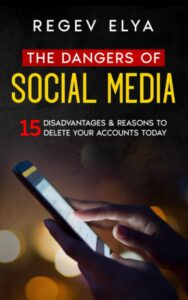In an age where our digital footprints seem to grow larger by the day, many of us have fallen into the habit of sharing our innermost thoughts and beliefs on social media platforms. While this may feel like a harmless way to express ourselves and connect with like-minded individuals, there’s a growing concern about the potential long-term consequences of publicly declaring our political affiliations and support for specific candidates. This blog post aims to explore the hidden dangers of political oversharing on social media and why maintaining privacy in our political views may be more crucial than ever.

The Allure of Virtual Virtue Signaling
It’s no secret that social media has become a breeding ground for what’s commonly known as “virtue signaling” – the act of publicly expressing opinions or sentiments intended to demonstrate one’s good character or moral correctness. In the political sphere, this often manifests as users passionately sharing content that aligns with their preferred party or candidate, effectively broadcasting their political leanings to their entire network and beyond.
At first glance, this might seem like a harmless or even positive form of civic engagement. After all, isn’t open political discourse a cornerstone of democracy? While healthy debate and information sharing certainly have their place, the problem arises when we fail to consider the potential long-term implications of our digital political declarations.

The Illusion of Deletion
One of the most dangerous misconceptions about social media is the belief that we have complete control over our online presence. Many users operate under the assumption that if they later regret a post or decide to change their stance on an issue, they can simply delete the offending content and move on. However, the reality is far more complex and concerning.
Even when we hit that “delete” button, our data doesn’t simply vanish into the ether. Social media platforms, search engines, and various third-party services often retain copies of our posts, shares, and even our browsing history. This information is frequently stored on cloud servers, creating a permanent record of our digital activities that can potentially be accessed or retrieved long after we believe it’s gone.
The sanctity of the voting booth, with its privacy curtains ensuring the confidentiality of our choices, stands in stark contrast to the public nature of our online political expressions. While we carefully guard our actual votes, many of us unwittingly broadcast our political preferences to a much wider audience through our social media activity.

The Potential for Future Repercussions
As we share our political views online, it’s crucial to consider how this information might be used in the future. While it may seem far-fetched now, history has shown us that political landscapes can shift dramatically, sometimes in unexpected and alarming ways. There’s a very real possibility that the political expressions we make today could be used against us in the future, particularly if more authoritarian or oppressive regimes come to power.
Imagine a scenario where a new government gains control and decides to crack down on those who previously supported opposition parties or candidates. With the vast amount of data available from social media platforms, it wouldn’t be difficult for such a regime to identify and target individuals based on their past online activity. What seemed like harmless political banter or support for a candidate years ago could potentially lead to serious consequences, including discrimination, persecution, or even incarceration.
It’s important to note that this concern isn’t limited to any particular political party or ideology. The potential for abuse exists across the political spectrum, and even supporters of smaller, minority parties could find themselves at risk if the political winds shift unfavorably.

The Erosion of Privacy and Personal Autonomy
Beyond the potential for future political repercussions, there’s also the more immediate concern of how our online political expressions might impact our personal and professional lives in the present. As employers, colleagues, and even potential romantic partners increasingly turn to social media to vet individuals, our political posts could influence how we’re perceived and the opportunities available to us.
Moreover, the act of constantly sharing our political views online can lead to a sort of self-imposed echo chamber, where we surround ourselves only with those who agree with us. This can contribute to increased polarization and a decreased ability to engage in nuanced, productive political discussions with those who hold different views.

Protecting Ourselves in the Digital Age
Given these concerns, what steps can we take to protect ourselves while still engaging in meaningful political discourse? Here are a few suggestions:
- Think before you post: Before sharing political content, consider whether it’s necessary to broadcast your views to your entire network. Could the same goal be achieved through private conversations or more targeted forms of political engagement?
- Utilize privacy settings: Familiarize yourself with and make use of the privacy settings on your social media accounts. Consider limiting who can see your political posts or creating separate, more private accounts for political discussions.
- Support causes, not just candidates: Instead of tying yourself to specific political figures, consider focusing your online activism on issues and causes you care about. This approach can be less polarizing and potentially less risky in the long run.
- Engage in real-world activism: Remember that meaningful political engagement often happens offline. Consider volunteering, attending local government meetings, or participating in community organizations as alternatives to online political posting.
- Stay informed about data privacy: Keep up with news and developments regarding data privacy laws and social media policies. Understanding how your data is collected and used can help you make more informed decisions about what you share online.

Conclusion
As we navigate the complex intersection of social media and politics, it’s crucial that we approach our online activities with caution and foresight. While the desire to express our political views and support our preferred candidates is understandable, we must weigh this against the potential long-term risks of oversharing.
By being mindful of what we post, utilizing privacy settings, and finding alternative ways to engage in political discourse, we can help protect ourselves from potential future repercussions while still participating in the democratic process. Remember, just as we cherish the privacy of the voting booth, we should also value the privacy of our personal political beliefs in the digital realm.
Ultimately, the goal is not to disengage from political discussions entirely, but rather to approach them thoughtfully and with an awareness of the lasting impact our digital footprints may have. In doing so, we can help preserve our personal autonomy, protect our future selves, and contribute to a healthier, more nuanced political discourse both online and offline.
Hey there! We hope you love our fitness programs and the products we recommend. Just so you know, Symku Blog is reader-supported. When you buy through links on our site, we may earn an affiliate commission at no extra cost to you. It helps us keep the lights on. Thanks.
Disclaimer: The information provided in this discussion is for general informational and educational purposes only. It is not intended as medical or professional advice. Only a qualified health professional can determine what practices are suitable for your individual needs and abilities.

